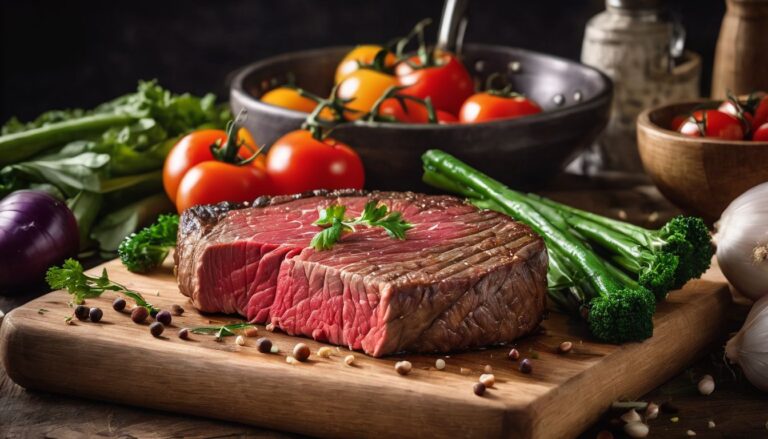Ground Beef Nutrition Facts: How One Superfood Can Transform Your Health in Seconds!

Trying to stick to a healthy diet but can’t resist the lure of savory ground beef? Ground beef is indeed packed with protein, providing 24 grams in just a 3.5-ounce serving. This article dives deep into the nutrition facts and health benefits of this popular ingredient, helping you incorporate it into your meals wisely.
Read on, as we unveil facts that could shake up your cooking routine!
Key Takeaways
- Ground beef is a rich source of protein, calories, fats, vitamins, and minerals.
- It contains essential nutrients like iron, zinc, and selenium that contribute to overall health.
- Ground beef supports cell growth, boosts the immune system, aids in hormone production, and replenishes iron stores.
- Choosing lean ground beef options can reduce fat intake while still enjoying the nutritional benefits.
Ground Beef Nutrition Facts

Ground beef is a rich source of calories, fats, protein, vitamins and minerals, as well as containing some carbohydrates.
Calories
A 3.5-ounce serving of ground beef packs approximately 218 calories, making it a substantial source of energy. This high caloric content primarily comes from its protein and fat characteristics.
While being mindful with portions is integral in calorie control, the calories can fuel your body’s daily functions effectively when incorporated into balanced meals. If you’re following specific diets like low-carb or ketogenic diet, ground beef offers a suitable option that aligns well with their nutrition requirements.
Fats

Ground beef, depending on the cut, can contain varying levels of fat. A 3.5-ounce serving typically has around 13 grams of fat, contributing to its calorie content and rich flavor.
It’s worth noting that leaner varieties are available which contain reduced amounts of fat; as low as 7% in some cases.
Contrary to popular belief, not all fats are detrimental to health. Saturated and trans fats found in ground beef contribute towards your daily intake but should be consumed sensibly within a balanced diet.
Additionally, ground beef provides essential fatty acids like omega-6 linoleic acid that play fundamental roles in brain function and cell growth.
Protein
Ground beef packs a potent protein punch, offering 24 grams in just a 3.5-ounce serving. Protein serves as the building blocks for our bodies, helping in cell repair and production throughout several body systems.
It assists in the manufacture of hormones and enzymes that are central to healthy bodily function. Not all protein sources are created equal, however; ground beef offers complete protein, meaning it contains all nine essential amino acids your body needs for optimum health benefits.
Incorporating lean ground beef nutrition into meals can contribute significantly to daily protein goals.
Vitamins and Minerals
Ground beef also contains important vitamins and minerals that contribute to overall health. It is a good source of vitamin B12, which helps with nerve function and the production of red blood cells.
Additionally, ground beef provides essential minerals like iron, zinc, and selenium. Iron is necessary for transporting oxygen throughout the body, while zinc supports immune function and wound healing.
Selenium acts as an antioxidant, protecting cells from damage caused by free radicals. Including ground beef in your diet can help ensure you’re getting these vital nutrients.
Carbohydrates
Ground beef is low in carbohydrates, making it a suitable choice for those watching their carb intake. A 3.5-ounce serving of ground beef does not contain any fiber or sugars, making it a good option for individuals following low-carb or ketogenic diets.
By choosing ground beef as a protein source, you can enjoy its nutritional benefits without consuming excessive carbs.
Health Benefits of Ground Beef

Ground beef provides several health benefits, including helping build cells, boosting the immune system, supporting hormone production, replenishing iron stores, and potentially being beneficial for allergies.
Helps build cells
Ground beef plays a crucial role in building and repairing cells in our body. It is an excellent source of high-quality protein, providing the essential amino acids needed for cell growth and repair.
With each 3.5-ounce serving containing 24 grams of protein, ground beef can help support muscle development and tissue regeneration. Its protein content makes it an ideal choice for athletes, active individuals, or anyone looking to maintain a healthy body composition.
So go ahead and enjoy your favorite ground beef recipes knowing that you’re fueling your cells with the nutrients they need to thrive.
Boosts immune system
Ground beef contains several nutrients, such as zinc and vitamin B6, that can help boost the immune system. Zinc plays a crucial role in maintaining a healthy immune response, while vitamin B6 supports the production of antibodies.
By including ground beef in your diet, you can give your immune system a natural boost to help fight off infections and diseases.
Supports hormone production

Ground beef supports hormone production due to its high levels of essential nutrients. It contains vitamins such as B12, which plays a vital role in maintaining healthy hormones. The iron found in ground beef is necessary for proper hormone synthesis and regulation.
Additionally, the protein content in ground beef provides the building blocks needed for hormone production within the body. Including ground beef in your diet can help support the healthy functioning of your hormones and overall well-being.
Replenishes iron stores

Ground beef is an excellent source of iron, which plays a crucial role in carrying oxygen throughout our bodies. When we consume ground beef, it replenishes our iron stores and helps prevent iron-deficiency anemia.
Iron is essential for the production of red blood cells, which transport oxygen to tissues and organs. Without enough iron, we may feel fatigued and experience difficulties concentrating.
Including ground beef in our diet can provide us with the necessary iron to support optimal bodily functions.
In fact, a 3.5-ounce serving of ground beef contains about 2 milligrams of iron. This amount contributes significantly towards meeting the daily recommended intake of this essential mineral.
Can be beneficial for allergies

Ground beef, despite being often associated with allergies, can actually be beneficial for individuals with certain allergies. It is a rich source of zinc and vitamin B12, which are known to support immune function and reduce allergy symptoms.
These nutrients help regulate the body’s response to allergens and strengthen the immune system against allergic reactions. Additionally, ground beef contains selenium, an antioxidant that may help alleviate symptoms associated with respiratory allergies such as asthma.
Incorporating lean ground beef into your diet in moderation can provide you with these essential nutrients while potentially helping to alleviate allergy-related issues.
Adverse effects

Consuming ground beef in excess or without moderation can have adverse effects on your health. One major concern is the high fat content found in ground beef, which can contribute to weight gain and increase the risk of heart disease.
Additionally, ground beef can be high in sodium, which may lead to elevated blood pressure levels if consumed in large quantities. It’s important to choose leaner cuts of ground beef to reduce fat intake and opt for healthier cooking methods like grilling or baking instead of frying.
Moderation is key when enjoying ground beef as part of a balanced diet.
Different Varieties of Ground Beef

Ground beef comes in a variety of options to suit different preferences and dietary needs. Here are some common varieties:
- Regular Ground Beef: This is the standard ground beef available in most grocery stores. It typically contains around 20% fat, making it flavorful and juicy.
- Lean Ground Beef: For those looking for a lower-fat option, lean ground beef is a great choice. It contains significantly less fat, usually around 7% or less, while still providing plenty of protein.
- Extra Lean Ground Beef: If you want an even leaner option, extra lean ground beef is available with only 5% fat content or less. This makes it ideal for those watching their saturated fat intake.
- Grass-Fed Ground Beef: Grass-fed beef comes from cows that have been raised on grass pastures rather than being grain-fed. It tends to have a higher omega-3 fatty acid content and may contain fewer antibiotics and hormones than conventionally raised beef.
- Organic Ground Beef: Organic ground beef comes from cows that have been raised without the use of antibiotics, growth hormones, or genetically modified feed. It meets specific organic standards set by certifying organizations.
- Kobe/Wagyu Ground Beef: Kobe or Wagyu ground beef is known for its high marbling and rich flavor. It comes from a specific breed of cattle raised in Japan under strict standards, resulting in tender and luxurious meat.
Proper Storage and Food Safety

Proper storage and food safety are crucial when handling ground beef. Here are some important guidelines to follow:
- Store ground beef in the refrigerator at a temperature of 40°F or below.
- Use ground beef within two days of purchase or freeze it for later use.
- If freezing, divide the ground beef into smaller portions to ensure even thawing.
- Thaw frozen ground beef in the refrigerator or using the defrost setting on your microwave.
- Cook ground beef thoroughly to kill any bacteria or pathogens. It should reach an internal temperature of 160°F.
- Avoid cross – contamination by keeping raw ground beef separate from other foods and using separate cutting boards and utensils.
- Wash your hands thoroughly before and after handling raw ground beef.
- Properly sanitize any surfaces or utensils that come into contact with raw ground beef to avoid cross-contamination.
Healthy Ways to Prepare Ground Beef

Grill or bake lean ground beef to reduce excess fat and calories.
Lean ground beef options
Lean ground beef options are a healthier choice when it comes to enjoying the nutritional benefits of ground beef. These options typically have lower fat content compared to regular ground beef.
For example, lean cuts can contain as little as 7% fat, making them a great alternative for those looking for a lower-calorie option. Choosing lean ground beef allows you to still enjoy the protein-rich benefits of this meat while reducing your intake of saturated fats.
This makes lean ground beef an excellent option for individuals who are watching their cholesterol levels or following a low-fat diet plan.
Recipes for healthier options
Looking to enjoy ground beef in a healthier way? Try these recipes:
- Ground Beef Stir-Fry: Saute lean ground beef with colorful vegetables like bell peppers, broccoli, and snap peas. Season with low-sodium soy sauce and garlic for a flavorful and nutritious meal.
- Lettuce Wraps: Swap out traditional hamburger buns for crisp lettuce leaves. Fill them with cooked seasoned ground beef, diced tomatoes, onions, and your favorite toppings for a healthier twist on burger night.
- Greek-inspired Bowl: Combine cooked ground beef with cucumber slices, cherry tomatoes, feta cheese, and a tangy Greek dressing. Serve over a bed of quinoa or brown rice for a protein-packed meal.
- Mexican Stuffed Peppers: Cut off the tops of bell peppers and remove the seeds. Stuff them with cooked ground beef mixed with black beans, corn, diced tomatoes, and spices like cumin and chili powder. Bake until the peppers are tender and the filling is heated through.
- Zucchini Boats: Cut zucchinis in half lengthwise and scoop out the centers to create “boats.” Fill them with cooked ground beef mixed with marinara sauce and top with grated Parmesan cheese. Bake until the zucchini is tender and the filling is bubbly.
- Asian Lettuce Cups: Cook ground beef seasoned with ginger, garlic, soy sauce, and hoisin sauce. Serve it in crisp lettuce cups along with shredded carrots, green onions, and chopped peanuts for added crunch.
Conclusion

Ground beef packs a powerful punch when it comes to nutrition. With its high protein content and essential vitamins and minerals, it can support cell growth, boost the immune system, and aid in hormone production.
Additionally, ground beef is a great source of iron and can be beneficial for those with allergies. Just remember to choose lean cuts and enjoy ground beef as part of a well-rounded diet for maximum health benefits.
FAQs
1. What are the nutrition facts for ground beef?
The nutrition facts of ground beef include protein, fat, carbohydrates, and several vitamins and minerals.
2. What’s the nutritional value of lean ground beef?
Lean ground beef contains less fat than regular ground beef while offering a high nutritional value with substantial amounts of proteins, vitamins and minerals.
3. Where can I find the nutrition information for ground beef?
You can usually find detailed nutrition info on packages of store-bought ground beef or through various health and fitness resources online.
4. How does the nutritional info for lean ground beef differ from regular ground beef?
While both offer essential nutrients, lean ground beef has fewer calories due to lower fat content but still retains good amounts of protein.
5. Does cooking affect the nutritional facts in my dish containing Ground Beef Nutrition?
Yes! Different methods like grilling or frying could alter your dish’s overall nutrient profile by either reducing some nutrients’ availability or adding extra fats.

Author
Years ago, the spark of my life’s passion ignited in my mind the moment I stepped into the local gym for the first time. The inaugural bead of perspiration, the initial endeavor, the very first surge of endorphins, and a sense of pride that washed over me post-workout marked the beginning of my deep-seated interest in strength sports, fitness, and sports nutrition. This very curiosity blossomed rapidly into a profound fascination, propelling me to earn a Master’s degree in Physical Education from the Academy of Physical Education in Krakow, followed by a Sports Manager diploma from the Jagiellonian University. My journey of growth led me to gain more specialized qualifications, such as being a certified personal trainer with a focus on sports dietetics, a lifeguard, and an instructor for wellness and corrective gymnastics. Theoretical knowledge paired seamlessly with practical experience, reinforcing my belief that the transformation of individuals under my guidance was also a reflection of my personal growth. This belief holds true even today. Each day, I strive to push the boundaries and explore new realms. These realms gently elevate me to greater heights. The unique combination of passion for my field and the continuous quest for growth fuels my drive to break new ground.















